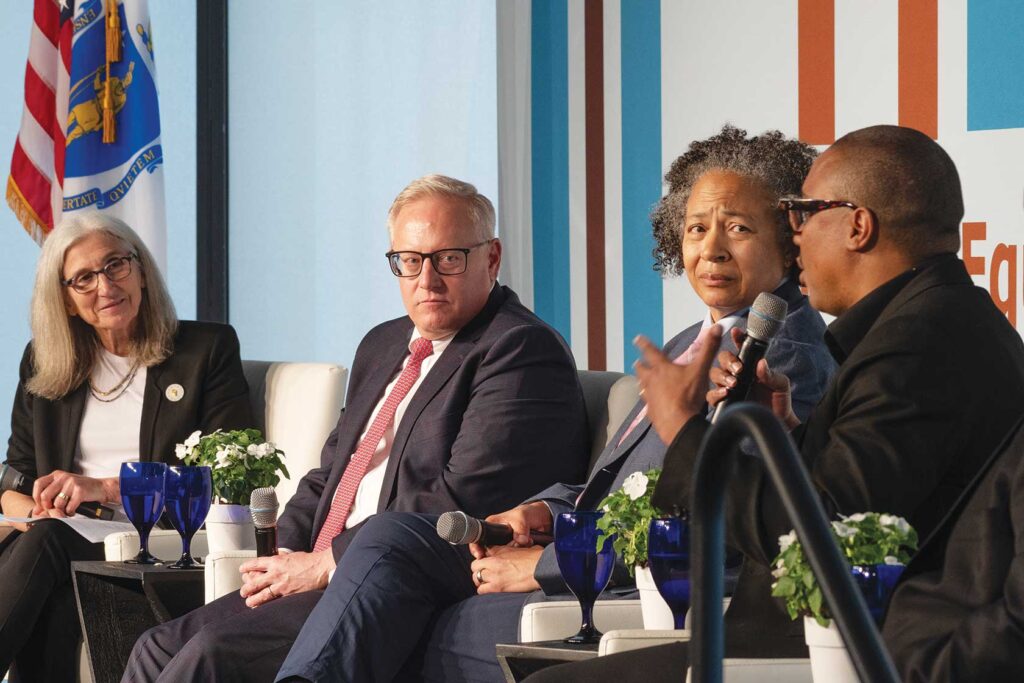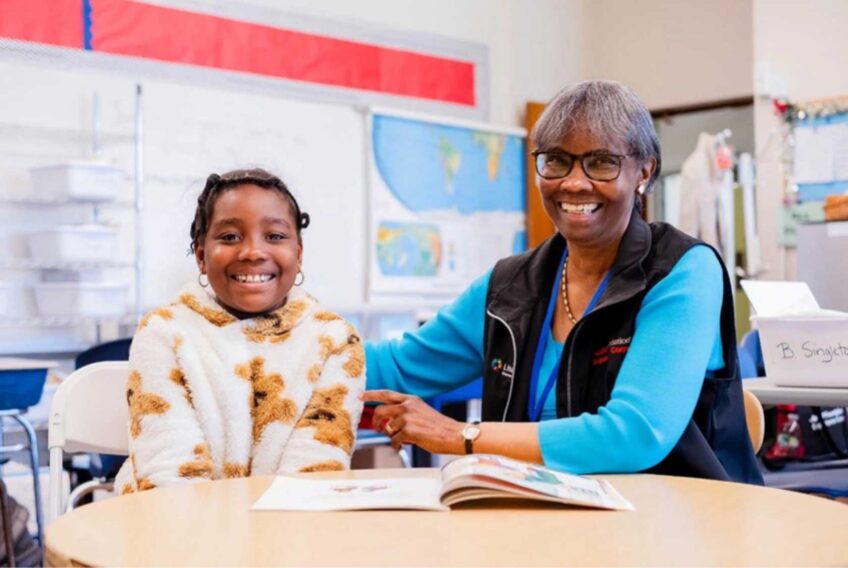Health Equity summit pushes back on cuts
Mass experts call for investment to combat Trump admin. rollbacks

When health leaders gathered, June 11, for the Health Equity Compact’s annual trends summit, it was a conversation overshadowed by a changing landscape under the federal administration of President Donald Trump.
At the event, which brought together almost 1,000 attendees at the John F. Kennedy Presidential Library and online, pending federal cuts to Medicaid, the Supplemental Nutrition Assistance Program and scientific research were a persistent specter — one that organizers said advocates across the state must push back on.
“We have a choice to make. We can wait and hope things get better on their own, or we can act now to protect our health and economic future,” said Michael Curry, president and CEO of the Massachusetts League of Community Health Centers and co-founder of the Health Equity Compact.
Cuts proposed by Trump and federal legislators that would cut programs that support access to health care and social determinants of health — like food access — as currently proposed would be “catastrophic,” said Gov. Maura Healey in opening remarks at the summit.
She called on attendees at the event to keep up the health equity work, despite challenging circumstances.
“The work of the Health Equity Compact is important work; it’s necessary work,” she said. “Do not take your foot off the gas.”
In her remarks, Healey said the state plans to try to counteract changes from the federal government that it sees as detrimental to health equity efforts, like the removal of data and disinvestment in research.
A challenging health landscape, Curry said, is not new. Throughout the day, speakers compared the challenges of the current political landscape to the struggles faced during the COVID-19 pandemic.
“Now we are in the midst of another crisis,” Curry said. “Not a viral outbreak, but a convergence of challenges to our health, our economy and our civil rights.”
Those cuts, he said, could cause overcrowding in emergency rooms, delayed care and costs that impact hospitals and businesses — and ultimately could raise insurance premiums for patients.
“We know that when we build a system that works for the most marginalized, we build a system that works better for everyone,” Curry said. “These cuts don’t just affect people on Medicaid or food assistance, it affects all of us.”
The spirit of pushing back was on display all afternoon, as speakers from the state’s Executive Office of Health and Human Services — the overarching state agency that includes the Department of Public Health, MassHealth and the Department of Transitional Assistance which oversees programs like SNAP and WIC — prominent health systems in the state and the attorney general’s office discussed the current landscape and what’s next in a series of panels entitled “Meeting the Moment.”
Dr. Kevin Churchwell, president and CEO of Boston Children’s Hospital, said a priority for him is to work with his team to determine what the rules of the road are, in the current landscape.
“Not that I will follow all the rules of the road,” Churchwell said. “But when I know the rules of the road, I know how to get around them and how to utilize them for the best benefit of our patients and families.”
And in response to a federal push against diversity, equity and inclusion, Secretary of Health and Human Services Kate Walsh said she sees a need to recognize that equity and quality are the same thing.
“Until we knit these together in everything that we say, it’ll be really easy to pick it apart,” Walsh said. “If you want to deliver the highest quality care to the people you serve, looking at it through the equity lens is absolutely fundamental to the work.”
A heightened focus on shared goals
Throughout the conference, the Health Equity Compact pushed for support of omnibus legislation focused on advancing health equity in the state. One prominent focus of the legislation for speakers at the event is its establishment of benchmarks that advocates said would make it easier to pursue statewide change.
One provision of the omnibus bill would create a time-limited legislative commission to define the elements of a framework for health equity goals, both in the short term and looking toward 2050.
That group, and the benchmarks they create would focus on reducing premature deaths — and reducing economic burdens from health inequities — caused by four areas of focus: cardiometabolic diseases like diabetes, stroke and heart attacks; maternal health; mental health and substance abuse; and preventable cancers.
Having a more structured framework of benchmarks will bring the Health Equity Compact’s goals around reducing disparities into greater focus, said Dr. Elsie Taveras, a pediatrician and chief community health and health equity officer at Mass General Brigham.
“It’s not enough to admire that North Star from a distance,” said Taveras, while introducing a panel on the benchmarks. “We must take measurable steps toward it.”
Health equity advocates at the summit spoke in support of the bill — which is slated for a hearing before the legislature’s Joint Committee on Health Care Financing in July — but also called for steps to adopt the benchmarks sooner through processes in the state’s executive branch.
“We don’t have to wait for the legislation to pass,” Taveras said. “No one loses sleep or doesn’t get more gray hair by waiting for any legislation.”
In her remarks she said the Health Equity Compact was inviting groups from across the state — from state leaders to health care systems, CEOs, private sector researchers and policymakers — to take action toward creating shared benchmarks sooner rather than later.
Similar work has already been launched by the state’s Executive Office of Health and Human Services, to some degree. In January 2024, the Healey-Driscoll administration announced its Advancing Health Equity in Massachusetts (AHEM) initiative, an effort through the Executive Office of Health and Human Services to reduce premature deaths from cardiometabolic disease and maternal health issues.
Under that effort the state is taking steps to reduce disparities, said Dr. Robbie Goldstein, commissioner of the Department of Public Health. That work has included working to certify doulas through the department and creating a certified midwife board to support maternal health.
“We have a lot to do ahead of us, but AHEM is really energized to keep moving,” Goldstein said.
Walsh said she believes that agency would get behind the benchmarks outlined in the bill. She pointed to the two drivers already included in the AHEM initiative. The four areas identified by the Health Equity Compact are “clearly the areas where the disparities are the worst, where there’s more years of lost life and more opportunities for us to improve.”
Goldstein said work around benchmarks and data will help inform better solutions to health disparities.
“The reality is that the disparities we see aren’t random and the data are helpful for us to understand exactly where we need to focus our efforts,” he said.
He said the Department of Public Health has tried to operate with the high-level strategy of establishing benchmarks across the whole department to create a shared set of goals and metrics so each bureau can see themselves in that number and is working toward the same goal.
That same concept, he said, could work at a broader scale beyond just the state government.
“What does that roll up to? How do we hold ourselves accountable to that higher-level number?” Goldstein said. “We’ve seen it work within state government, which I think some people thought wouldn’t happen. I think we can make it work across the Commonwealth.”
A broad slate of equity priorities
The far-reaching omnibus bill also includes other priorities, like expanding access to support services like patient navigation and interpreters, ensuring access to telehealth and removing immigration status as a barrier to full access to MassHealth.
The legislation also proposes steps around increasing the number of doctors in high-need areas and expanding career growth opportunities for diverse health workers.
At the summit, the Health Equity Compact highlighted a health education program in Brockton called the Hometown Healthcare Academy, which, among other goals, looks to connect students to health care careers.
That program includes a Youth Health Advisory Council that organizes events in the community based on their health priorities; a general health education session open to students at Brockton High School; a Career Step program that connects seniors with hands-on education around health care careers; and a youth and family mentorship effort that looks to support parents as they support their students.
“We were motivated to address the need for the development of health care change agents of now as well as health care leaders and providers of tomorrow that actually represent the community,” said Marissa Rodrigues, youth health care program coordinator with the program.
Staff from the program said that one need programs like theirs face is continued financial support — something that is especially pertinent as the federal funding landscape shifts under the Trump administration.
For the Hometown Healthcare Academy, that call was met at the summit, when a representative from the Atrius Health Equity Foundation, which funded the launch of the program, announced a continuing investment of $4.5 million to keep the program running.
The Health Equity Compact also called for an increased focus on primary care to improve health before patients even have to visit a specialist to address a specific problem.
“Primary care is literally the only specialty when you increase the number of clinicians in the community, it decreases morbidity and mortality,” said Dr. Renee Crichlow, chief medical officer at Codman Square Health Center during a panel at the summit. “People live longer and healthier when there are more primary care clinicians in the community.”
Speakers on the panel called for better steps to invest in and focus on primary care, including improvements in tracking of investments that already exist. They suggested that steps that decrease the administrative load for primary care physicians will help these clinicians better serve their patients.
Already, the state is making an effort to consider how to improve access to primary care. A health-care-focused law, signed by Healey in January, included a provision to create a primary care task force, set to develop recommendations to stabilize and strengthen the primary care system.
That landscape sets the stage for a moment of change, panelists said.
“If we let this opportunity go by to shift this system, then it’s shame on us,” said Sen. Cindy Friedman, co-chair of the Joint Committee on Health Care Financing, who moderated the panel on primary care.
Throughout the day, members and supporters of the Health Equity Compact called for continued investment in equity generally, especially in light of shifts at the federal level.
Curry called all the event’s attendees to action and said that each person had a role to play in decreasing health disparities.
“Because this is Massachusetts, we have the people, the talent, the infrastructure, the relationships to lead through this moment, if we choose,” Curry said.






